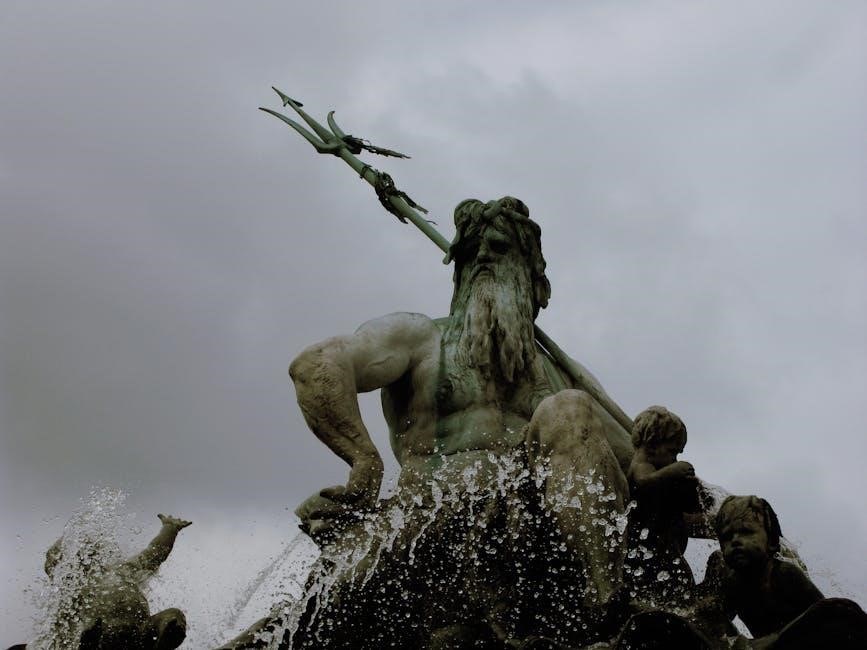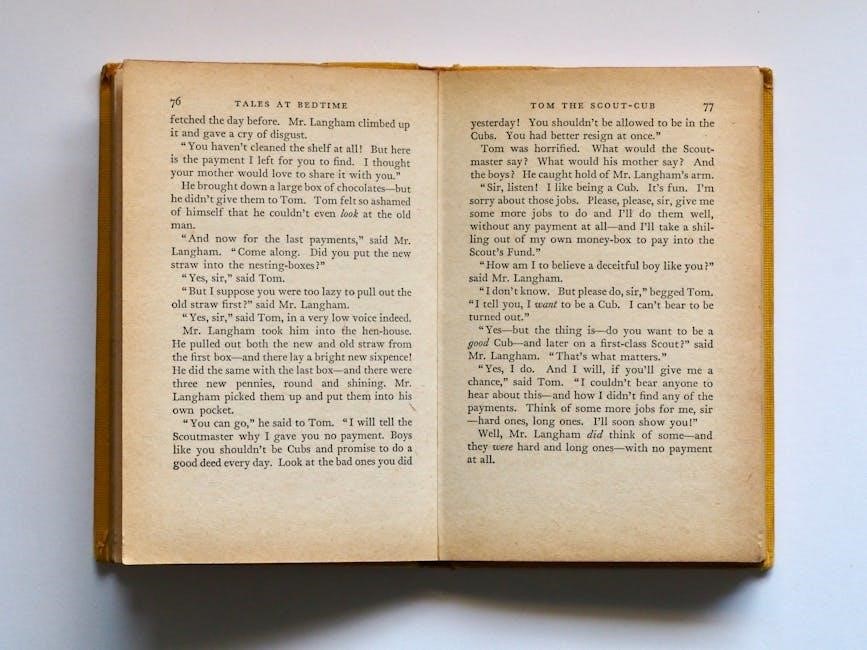Greek mythology is a treasure trove of fascinating tales featuring heroes‚ gods‚ and monsters. These stories explain natural phenomena and human experiences through legendary characters and events‚ captivating audiences for centuries.
1.1. What is Greek Mythology?
Greek mythology is a collection of stories that explore the origins of the world‚ the lives of gods and goddesses‚ and the adventures of heroes and monsters. These tales were used by ancient Greeks to explain natural phenomena‚ the workings of the universe‚ and the complexities of human nature. Myths often featured Olympian gods like Zeus and Hera‚ legendary heroes such as Hercules and Perseus‚ and terrifying creatures like Medusa and the Minotaur. They served as moral lessons‚ cultural narratives‚ and entertainment‚ shaping the beliefs and practices of ancient Greek society. Over time‚ these stories have endured‚ inspiring art‚ literature‚ and popular culture‚ making Greek mythology a timeless and universal treasure.
1.2. Key Themes in Greek Myths
Greek myths explore universal themes such as the struggle between order and chaos‚ the nature of humanity‚ and the inevitability of fate. Many stories highlight the complexities of human emotions like love‚ greed‚ and ambition‚ often through the actions of gods and heroes. Another prominent theme is the balance of power‚ as gods‚ monsters‚ and mortals interact in a world governed by divine rules yet prone to chaos. Moral lessons are embedded in these tales‚ teaching audiences about justice‚ courage‚ and the consequences of hubris. Additionally‚ myths often explain natural phenomena and the origins of cultural practices‚ blending fantasy with philosophical reflections on life and the cosmos.
The Gods of Mount Olympus
The Olympian gods‚ led by Zeus‚ ruled from Mount Olympus‚ shaping destiny and controlling natural forces. Their divine powers and intricate relationships shaped ancient Greek beliefs and stories.
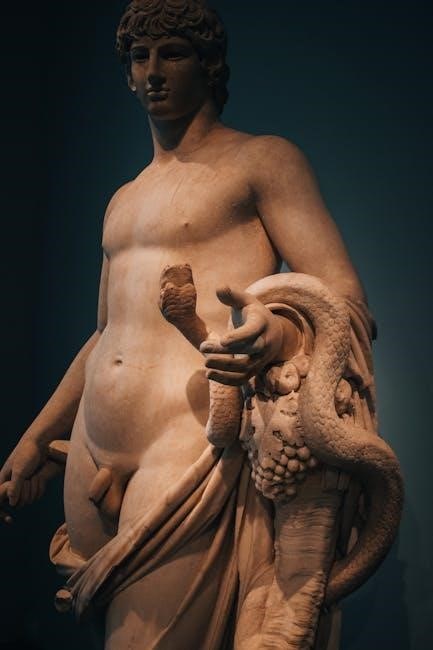
2.1. Major Olympian Gods
The major Olympian gods include Zeus‚ the king of the gods‚ who ruled the skies; Hera‚ the queen and goddess of marriage; Poseidon‚ the god of the sea; and Hades‚ the ruler of the Underworld. Demeter‚ the goddess of agriculture‚ and Athena‚ the goddess of wisdom‚ were also prominent. Apollo and Artemis represented the sun and the hunt‚ while Ares‚ the god of war‚ and Aphrodite‚ the goddess of love‚ played significant roles. Hephaestus‚ the blacksmith of the gods‚ and Hermes‚ the messenger‚ were equally important. Dionysus‚ the god of wine and festivities‚ completed the pantheon. Each god had distinct powers and domains‚ shaping the narratives of Greek mythology and influencing human affairs from their divine realm on Mount Olympus.
2.2. Gods and Their Roles
In Greek mythology‚ the gods were central to the functioning of the universe and human life. Zeus‚ as king‚ controlled the skies and enforced justice‚ while Poseidon ruled the seas‚ often causing earthquakes. Hades governed the Underworld‚ overseeing the dead. Hera‚ Zeus’s wife‚ protected marriage and family‚ though her jealousy was legendary. Athena‚ the wise warrior‚ presided over strategy and wisdom‚ often aiding heroes like Odysseus. Apollo and Artemis were associated with the sun‚ music‚ and the hunt. Ares thrived on war‚ while Aphrodite embodied love and desire. Hephaestus‚ the blacksmith‚ crafted divine weapons‚ and Hermes‚ the swift messenger‚ connected gods and mortals. Dionysus‚ god of wine and festivals‚ brought joy and chaos. Each god’s role was distinct‚ yet interconnected‚ shaping the cosmic order and influencing mortal lives profoundly.
Heroes of Greek Mythology
Greek mythology’s heroes‚ like Hercules‚ Odysseus‚ and Perseus‚ are renowned for their bravery and cunning. Their epic quests and triumphs over monsters have become timeless legends‚ inspiring generations.
3.1. Famous Heroes
Greek mythology is rich with legendary heroes whose tales have endured for centuries. Hercules‚ known for his incredible strength‚ famously completed the Twelve Labors‚ battling fearsome monsters like the Nemean Lion and Hydra. Odysseus‚ the cunning king of Ithaca‚ is celebrated for his ten-year journey home after the Trojan War‚ as chronicled in Homer’s The Odyssey. Perseus‚ another iconic hero‚ is renowned for beheading the snake-haired Medusa. These heroes‚ with their bravery and wit‚ embody the ideals of ancient Greek culture. Their stories‚ filled with challenges and triumphs‚ continue to captivate audiences‚ inspiring art‚ literature‚ and popular culture. The legacies of these heroes highlight the human spirit’s capacity for resilience and greatness‚ making them timeless figures in mythology.
3.2. The Role of Heroes
In Greek mythology‚ heroes played a vital role as embodiment of human ideals and virtues. They were often tasked with overcoming extraordinary challenges‚ battling fearsome monsters‚ and completing quests that benefited humanity. Heroes like Hercules and Perseus exemplified courage‚ strength‚ and determination‚ inspiring others to face adversity. Their stories served as moral lessons‚ teaching the importance of perseverance‚ wisdom‚ and loyalty. Additionally‚ heroes often bridged the gap between mortals and gods‚ demonstrating how human qualities could influence divine events. Through their journeys‚ heroes revealed the complexities of human nature‚ highlighting both triumphs and flaws. Their legacies endure‚ offering timeless insights into the human condition and the pursuit of greatness‚ ensuring their relevance in modern culture and storytelling.
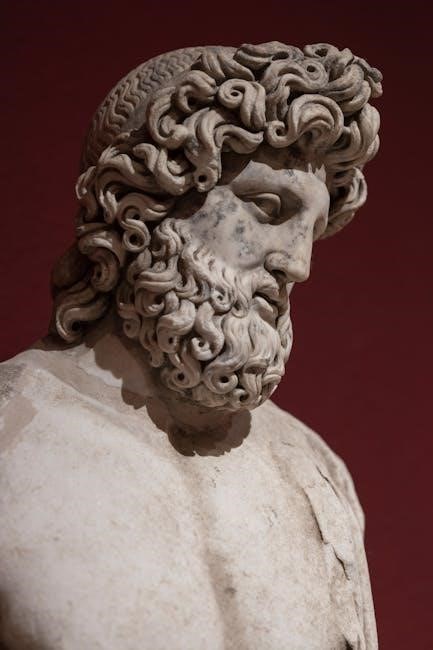
Monsters in Greek Mythology
Greek mythology is rich with terrifying monsters‚ embodying human fears and chaos. Creatures like the Furies‚ harpies‚ and gorgons symbolized divine wrath and moral consequences‚ challenging heroes and mortals alike.
4.1. Famous Monsters
Greek mythology is renowned for its terrifying and fascinating monsters‚ each with unique traits and roles in legendary tales. The Medusa‚ with her snake-like hair and petrifying gaze‚ is one of the most iconic creatures. Another fearsome monster is the Minotaur‚ a half-man‚ half-bull confined to the Labyrinth. The Chimera‚ a fire-breathing creature with the head of a lion‚ body of a goat‚ and tail of a serpent‚ symbolized unchecked chaos. The Sphinx‚ famous for its riddle‚ terrorized Thebes until Oedipus solved its mystery. Lastly‚ the Hydra‚ a serpent-like monster with multiple heads‚ was a formidable challenge for Hercules. These creatures embody the fears and moral lessons of ancient Greek society‚ making them timeless figures in mythology.
4;2. The Role of Monsters

In Greek mythology‚ monsters serve as symbols of chaos‚ evil‚ and the unknown‚ often embodying human fears and moral dilemmas. They frequently act as obstacles for heroes to overcome‚ testing their courage and strength. These creatures also represent natural phenomena or societal threats‚ providing explanations for the world’s complexities. Monsters like the Hydra and Chimera highlight the struggle between order and chaos‚ while others‚ such as Medusa‚ symbolize punishment for hubris. Their roles in myths not only entertain but also convey moral lessons‚ reinforcing cultural values. By challenging heroes‚ monsters underscore the importance of bravery and wisdom‚ making them indispensable to the narrative fabric of Greek mythology and its enduring influence on literature and art.
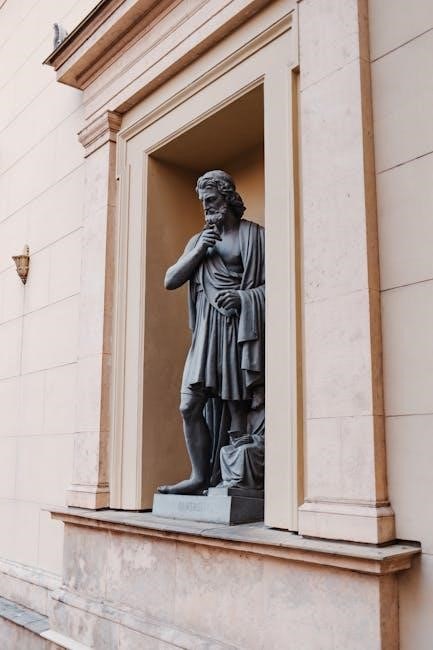
The Relevance of Greek Myths in Modern Times
Greek myths continue to inspire modern culture‚ influencing literature‚ film‚ and psychology. Their timeless themes of heroism‚ morality‚ and human struggle remain universally relatable and enduringly significant.
5.1. Greek Myths in Popular Culture
Greek myths continue to captivate modern audiences through various forms of media. Books like Bernard Evslin’s Heroes‚ Gods‚ and Monsters of the Greek Myths have inspired countless adaptations. Movies such as Clash of the Titans and Hercules bring mythological tales to life on the big screen. Additionally‚ popular franchises like Percy Jackson and the Olympians reintroduce these stories to younger generations. Television shows and video games also draw inspiration from Greek mythology‚ incorporating legendary creatures and divine characters. These modern retellings highlight the timeless appeal of Greek myths‚ allowing them to remain relevant in contemporary culture. By reimagining these ancient stories‚ they continue to shape our understanding of heroism‚ morality‚ and human nature‚ proving their enduring influence on storytelling and art. The integration of Greek myths into popular culture ensures their legacy endures for future generations.
5.2. Lessons from Greek Myths
Greek myths are a timeless source of wisdom‚ offering insights into human nature‚ ethics‚ and the consequences of actions. They often highlight universal themes such as ambition‚ greed‚ and the dangers of hubris. Stories like Prometheus defying Zeus or Icarus ignoring warnings teach valuable lessons about boundaries and humility. These myths also explore complex emotions and moral dilemmas‚ providing guidance on navigating life’s challenges. Bernard Evslin’s Heroes‚ Gods‚ and Monsters of the Greek Myths emphasizes how these tales remain relevant today‚ helping readers reflect on their own choices and values. By studying Greek myths‚ individuals can gain a deeper understanding of human behavior and the enduring principles of justice‚ courage‚ and wisdom. These lessons continue to inspire personal growth and ethical decision-making in modern times.
